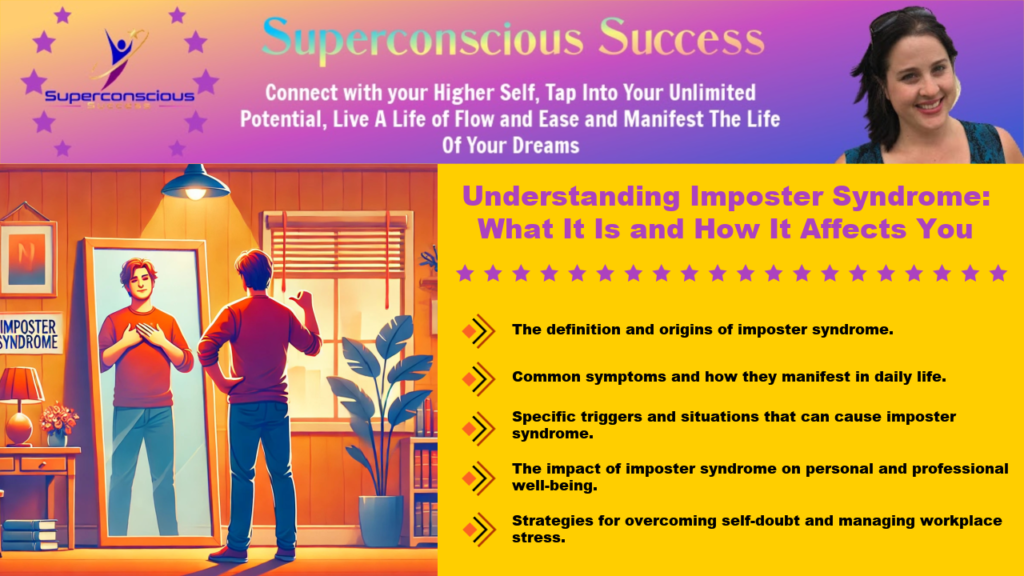
Are you curious about overcoming self-doubt and understanding the psychological phenomenon known as imposter syndrome? In this blog post, we’ll dive deep into what imposter syndrome is, explore its common symptoms, and discuss the triggers and situations that can cause it. Additionally, we’ll examine the profound impact it can have on your life, from workplace stress to personal relationships. By the end of this post, you’ll have a better grasp of how to recognize and manage these feelings, fostering a healthier and more balanced perspective on your accomplishments and self-worth.
Page 1
Page 2
Additional Information
What is Imposter Syndrome?
Have you ever felt like a fraud despite your evident success and accomplishments? If so, that’s imposter syndrome—a psychological phenomenon where self-doubt and a persistent fear of being exposed as a fraud creep in. As a result, you might feel like you don’t deserve your achievements. Therefore, overcoming self-doubt is crucial in these situations to foster a healthier mindset.
The term “imposter syndrome” was coined by psychologists Pauline Clance and Suzanne Imes in 1978. They initially focused on high-achieving women who, despite their successes, struggled with feelings of inadequacy and self-doubt. However, over time, it became clear that imposter syndrome can affect anyone, regardless of gender, age, or profession. It impacts a diverse range of individuals, from students and professionals to celebrities.
One key aspect of imposter syndrome is its universality. It can affect anyone, regardless of their level of success or expertise. For example, a seasoned executive may feel just as much like an imposter as a new employee starting their career. This psychological phenomenon can manifest in different ways. Sometimes it is a temporary experience triggered by specific situations. Other times, it is a chronic condition that individuals grapple with throughout their lives.
Imposter syndrome often makes you attribute your success to luck or external factors, discounting your achievements, and fearing that others will eventually unmask you as a fraud. These feelings can lead to significant stress, anxiety, and even depression, impacting your personal and professional life. Overcoming self-doubt is the first step in addressing these challenges.
Understanding imposter syndrome is the first step in addressing it. By recognizing the signs and acknowledging how common this feeling is, you can take proactive steps to manage and overcome it. This will foster a healthier and more balanced perspective on your accomplishments and self-worth.
Common Symptoms of Imposter Syndrome
Imposter syndrome shows up in various ways that can impact your personal and professional life. One common symptom is chronic self-doubt. You might often question your abilities and feel inadequate despite clear evidence of your success. This lack of self-confidence can lead you to undervalue your achievements and feel undeserving of your accomplishments.
Another common symptom is attributing success to external factors rather than personal effort or skill. You might credit your achievements to luck or timing, rather than acknowledging your hard work and talent. This mindset can prevent you from recognizing your true potential and hinder your personal and professional growth.
The fear of not living up to expectations is another significant symptom. This fear can drive you to overwork yourself in an attempt to avoid being ‘found out’ as a fraud. Excessive workloads can lead to burnout, which is a state of physical, emotional, and mental exhaustion caused by prolonged stress. Additionally, you may downplay your achievements and feel uncomfortable with praise or recognition. Constantly striving for perfection can also become an issue, as you try to prove your worth.
These symptoms can also have a profound psychological and emotional impact. The persistent self-doubt and fear of failure can lead to anxiety and depression, further exacerbating feelings of inadequacy. The constant pressure to perform and the inability to enjoy successes can create a cycle of stress and dissatisfaction.
In everyday life, these symptoms can affect your personal relationships, as you may struggle with feelings of unworthiness and fear of judgment. Professionally, it can lead to missed opportunities, as you might avoid taking on new challenges or leadership roles due to fear of failure. Recognizing these symptoms is the first step towards addressing and overcoming imposter syndrome, allowing you to lead a more fulfilling and balanced life.
Continue Reading (Page 2)
Triggers and Situations That Can Cause Imposter Syndrome
Imposter syndrome often arises when certain situations or triggers amplify feelings of inadequacy and self-doubt. These triggers vary but often involve changes, increased expectations, or challenges that put us outside our comfort zones. By understanding these triggers, we can better manage the impact of imposter syndrome on our mental health and professional growth.
Starting a New Job or Role
One of the most common triggers for imposter syndrome is starting a new job or role. Transitioning into a new position can feel overwhelming, especially if the role is significantly different from what you’ve done before. You might question whether you truly deserve the opportunity, feeling like you’ve somehow “tricked” your way into the job. This feeling is often heightened in high-stakes industries where the pressure to perform is relentless, contributing to increased workplace stress. The combination of new responsibilities, unfamiliar tasks, and the fear of not measuring up can make you doubt your competence, even if you’re fully qualified for the role.
Receiving a Promotion
Similarly, receiving a promotion can trigger imposter syndrome. Promotions typically come with increased responsibilities and higher expectations, which can lead to heightened self-scrutiny and fear of failure. The added pressure to meet these new demands may cause you to doubt your abilities, despite evidence of your success. You might start attributing your achievements to luck, timing, or other external factors, rather than your skills and hard work. This can create a cycle where you constantly feel the need to prove yourself, even though you’ve already earned the promotion.
Entering a Competitive Environment
Entering a highly competitive environment is another scenario that can exacerbate imposter syndrome. In fields where competition is intense—such as academia, technology, or finance—comparison with peers can become a daily struggle. Constantly measuring yourself against others can trigger feelings of inadequacy, as you may perceive yourself as less capable or less deserving of your accomplishments. This perception is often distorted but can be powerful enough to fuel imposter syndrome, making you question your place in the competitive landscape.
Being in the Minority
Being in the minority within a particular field, whether by gender, race, or another attribute, can significantly contribute to imposter syndrome. For instance, if you’re a woman in a male-dominated industry, you might feel additional pressure to prove yourself. This pressure can lead to increased self-doubt and a heightened sense of not belonging. Similarly, individuals from underrepresented racial or ethnic groups may experience imposter syndrome more acutely due to systemic biases and microaggressions that reinforce feelings of being an outsider. The challenge of navigating these environments can intensify imposter feelings, making it difficult to recognize and celebrate your own achievements.
Recognition and Awards
Interestingly, even positive events like receiving recognition or awards can trigger imposter syndrome. When you receive accolades, you might feel unworthy of the recognition, fearing that you’ll be exposed as a fraud. This paradoxical response to success can perpetuate a cycle of self-doubt and anxiety, as you begin to question whether you truly deserve the praise. For example, a software engineer who receives an industry award for innovation might internally question their worthiness of the honor, attributing their success to external factors rather than their own skills and talent. This scenario highlights how recognition can sometimes heighten imposter syndrome instead of alleviating it.
Mitigating the Impact of Imposter Syndrome
Understanding these triggers is key to mitigating imposter syndrome. Recognizing the situations that fuel these feelings enables individuals and organizations to develop strategies to reduce its impact. Mentorship programs, inclusive environments, and open discussions about self-doubt can help create supportive workplaces. By addressing these triggers, we foster healthier environments where everyone feels valued and empowered.
The Impact of Imposter Syndrome on Your Life
Imposter syndrome can profoundly affect your life, undermining both personal and professional well-being. One major impact is on mental health. Struggling with imposter syndrome often leads to heightened stress and anxiety. The constant fear of being exposed as a “fraud” can cause chronic stress, potentially escalating into depression. This self-doubt drains your emotional energy, making daily tasks overwhelming.
In personal relationships, imposter syndrome creates barriers. You may struggle with intimacy and trust, fearing loved ones will discover your perceived inadequacies. This can lead to isolation and withdrawal, as you avoid exposure or rejection. The inability to accept praise can also strain relationships, as it may seem like you’re dismissing others’ support.
Professionally, imposter syndrome is equally harmful. It can decrease job satisfaction, as you struggle to take pride in your work. Fear of failure may prevent you from seeking new opportunities, stifling career growth. This stress can also hurt job performance, creating a cycle of perceived inadequacy and underperformance.
Recognizing the impact of imposter syndrome is crucial for managing it. Awareness helps you seek support and develop strategies to improve mental health, strengthen relationships, and achieve career fulfillment.
Explore our Offers
Explore our podcast episodes on spirituality and personal growth, and join our FREE TUWC Family Membership for exclusive content and connections. Visit our About Page to learn more about Super Conscious Success. We’re excited to introduce our sister sites, each focused on different aspects of holistic wellness. The Self Empowered Empath supports empaths with emotional and mental health, Ask Naturopath Jen offers physical health and holistic wellness tips, and Tri-Unity Wellness Collective provides personalized coaching. Plus, explore TUWC Academy for diverse courses across five mini academies, including spiritual health, emotional wellness, physical health, conscious parenting, and spiritual entrepreneurship.
Additional Posts/Resources
The Root Causes of Imposter Syndrome: Exploring the Psychology Behind It(Opens in a new browser tab)
Self Worth and Imposter Syndrome Toolkit
Struggling with self-doubt or feeling like an imposter? Our Self-Worth and Imposter Syndrome Toolkit is here to help! This free resource offers practical exercises, insightful guides, and powerful affirmations to boost your self-worth and tackle imposter syndrome head-on. Download your toolkit now and start your journey towards a more confident, empowered you.

















